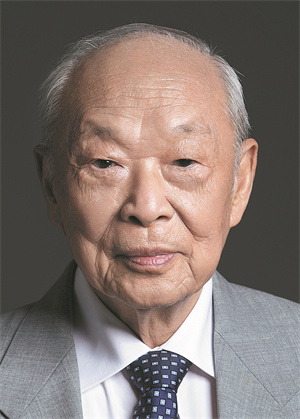Leading scientist given nation's highest honor


Wang Zhenyi, a world-leading scientist whose breakthrough in the field of leukemia treatment has saved hundreds of thousands of lives at home and abroad, has been awarded China's top honor.
According to an order signed on Friday by President Xi Jinping, Wang was among the four notable figures to be given the Medal of the Republic, the nation's highest honor.
In 1986, Wang was the world's first medical scientist to convert cancer cells in leukemia patients into normal ones in clinical practice, a treatment that has drastically improved the remission rate of the highly fatal type of blood cancer — acute promyelocytic leukemia (APL), and has been used in many other countries and regions, including Europe, Japan, the United States, Italy, Australia and Cuba.
"In retrospect, I focused on doing just one thing throughout my entire career — to be responsible for patients," said Wang, 99, a tenured professor at Shanghai Ruijin Hospital and an academician with the Chinese Academy of Engineering.
When first embarking on his medical career, he witnessed patients afflicted by leukemia, especially APL, which took their lives within half a year in 90 percent of cases.
As a result, Wang, who later became the only physician so far among the laureates of China's highest science honor, the State Preeminent Science and Technology Award, made conquering the disease his lifelong goal.
His research in this field began in 1979, and in 1986 he prescribed the medicine, all trans-reinoicacid (ATRA), that he had discovered in order to treat APL patients, to a 5-year-old girl suffering from the disease and in a critical condition.
The girl took the medicine for a week, and her condition was reversed. She was completely cured after a month.
This was widely recognized as the world's first case that put the theory of induced differentiation of leukemia cells into practice.
Moreover, the woman is still alive and healthy today.
Wang and his team treated a total of 24 patients that way within a year and all of them went into complete remission.
The results were later published in a paper, which immediately caused a sensation around the world.
Wang, whose therapy was soon promoted throughout China, then focused on the pricing of the medicine to make it affordable to patients and their families.
He decided to abandon the patent application and do his best to reduce the price of the drug.
When the medicine was first launched in the domestic market more than three decades ago, the price of a box of 10 capsules was about 11 yuan ($1.55).
Today, a box of the medicine is priced at 290 yuan, and it has been included in the National Reimbursement Drug List. Other similar tumor therapies are priced at over 20,000 yuan.
"I never calculated how much I could personally earn from the development of the medicine. My only hope was that more patients could be saved," Wang said.
Years later, Wang and his students Chen Zhu and Chen Saijuan proposed the treatment method of ATRA combined with the traditional Chinese medicine compound arsenic trioxide, raising the five-year survival rate of APL, which was once regarded as the most dangerous type of leukemia, from 10 percent in 1978 to over 95 percent, and making it the world's first curable leukemia.
Some media overseas hailed the treatment method as "the Shanghai Plan", and listed it as "one of New China's eight major contributions to the world's medical field "along with the invention of qinghaosu, or artemisinin.
Chen Zhu, former minister of health, said, "Wang is not only our teacher, but also a role model who deserves our respect for a lifetime for his scientific spirit, superb medical skills, ethics as a teacher, and his personality."
- Zhuhai man given death for car attack
- China revises upper age limit for driver's license
- Infant immunization schedule changes from Jan 1
- Peak season for respiratory illnesses continues
- Former deputy Party chief of Shanxi given life sentence for bribery
- One-year-old, Beijing Library serves book lovers with passion





































